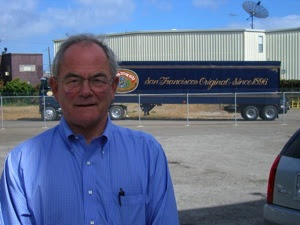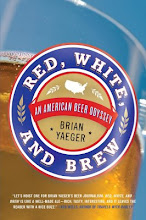 Though I covered this in the SF Weekly's SFoodie blog and the SF Beer Examiner blog, the sale of Anchor this week keeps me pondering. Don't ask me to rattle off everything great about craft beer and the industry, but one thing I've discussed frequently is that all the forefathers, the pioneers, the movers, shakers, and brewers who got the keg rolling are, for the most part, still around. What other industry could that be said for? Luminaries such as Boston Beer's Jim Koch and Sierra Nevada's Ken Grossman are still captaining their ships, still vibrant and show no signs of slowing down; in fact, both of them keep ramping up great projects. This is what I set out to discover when I started working on Red, White, & Brew. While there was Dick Yuengling and Jake Leinenkugel whose great-great-grandfathers built the breweries they now preside over, I met with D.L. Geary who founded the first microbrewery in New England, Larry Bell who started Michigan's first, Carol Stoudt, the first female craft brewery owner, and more. While all of them have kids now who are working for them and learning the ropes in the hope that one day they take the reins from dear old Dad or Mom, the undisputed father of American craft beer is Fritz Maytag who bought the sinking Anchor Brewery in 1965. This week, after 45 years, he sold it. Just up and sold it.
Though I covered this in the SF Weekly's SFoodie blog and the SF Beer Examiner blog, the sale of Anchor this week keeps me pondering. Don't ask me to rattle off everything great about craft beer and the industry, but one thing I've discussed frequently is that all the forefathers, the pioneers, the movers, shakers, and brewers who got the keg rolling are, for the most part, still around. What other industry could that be said for? Luminaries such as Boston Beer's Jim Koch and Sierra Nevada's Ken Grossman are still captaining their ships, still vibrant and show no signs of slowing down; in fact, both of them keep ramping up great projects. This is what I set out to discover when I started working on Red, White, & Brew. While there was Dick Yuengling and Jake Leinenkugel whose great-great-grandfathers built the breweries they now preside over, I met with D.L. Geary who founded the first microbrewery in New England, Larry Bell who started Michigan's first, Carol Stoudt, the first female craft brewery owner, and more. While all of them have kids now who are working for them and learning the ropes in the hope that one day they take the reins from dear old Dad or Mom, the undisputed father of American craft beer is Fritz Maytag who bought the sinking Anchor Brewery in 1965. This week, after 45 years, he sold it. Just up and sold it.While not the same level of severity as Kennedy's assassination or a man walking on the moon, I'll never forget when I heard the news. I was at the New Orleans airport returning from Jazz Fest Monday night when Half Pint texted me the news, informing me that our friend Jesse from Beer and Nosh was the first to post it. The shock hasn't really worn off.

Maytag is 72. Last month, Ken Allen, 70, sold Anderson Valley Brewing Co. As the pioneers
reach retirement age, this will happen more and more. It's inevitable. Change is constant. Even among the breweries I selected for RW&B, where longevity was a top criterion, half of the 14 have undergone major changes. And the fact that I picked 14 to represent just 1% of the then-1,400 breweries means it is likely that half of all breweries have experienced such transitions. To wit:
- Leinenkugel's was already owned by Miller. But the SAB-Miller/MolsonCoors merger of their US operations means that Leinie's is now owned by MillerCoors.
- New Belgium is employee-owned, but founders Kim Jordan and Jeff Lebesch were majority shareholders. They seemed an odd pairing--her nurturing and talkative, him taciturn and retiring. I just found out they are recently divorced and Lebesch has been completely bought out.
- Grand Teton was quietly sold by founder Charlie Otto after some 20 years.
- Widmer Bros. merged with Redhook, both already partly-owned by Anheuser-Busch, to form Craft Brewers Alliance with Kona and Goose Island falling under their umbrella.
- Anchor, the very first craft brewery, sold, along with its distilling business which was also a revolution in craft adult beverages.
- Electric Brewing in remote Bisbee, Ariz, everybody's favorite chapter, was sold to a couple of guys who recently opened Dave's Electric Brewpub in Tempe (founded by Electric Dave in 1988, one of the new owners name is also Dave). Far worse, Electric Dave was recently in a life-threatening car accident but is recovering in Bisbee.
- Dixie Brewing in New Orleans continues to be contract brewed in Wisc. and its return to the Big Easy grows ever unlikely.
Names and faces are changing. Fortunately, beer continues to get better and better. Go enjoy an Anchor Steam and count your blessings.
Cheers








1 comment:
And related to Maytag selling Anchor, as the industry grows, more corporations and investor types are getting into the business, with the good and bad associated with that.
Like it or not, the very success of craft beer makes it difficult to avoid becoming corporate in nature.
Are you holdidng a pool to see what chapter/brewery goes next?
Post a Comment